Karen Evans-Reeves
On June 1st 2025 a ban on the sale of single-use vapes came into force in the UK. The law, introduced by the Department for Environment and Rural Affairs (DEFRA) aims to reduce the appeal of vaping to youth and stem the environmental damage of plastic and toxic waste.
This law comes ahead of the forthcoming Tobacco and Vapes Bill which has had its second reading in the House of Lords and is awaiting Committee stage. When enacted, the Bill aims to introduce a smokefree generation by phasing out sales of tobacco products to those born after 1 January 2009. The legislation will also ban the promotion and sponsorship of nicotine products including vapes and nicotine pouches.
Indoor point of sale displays receive an update
In the absence of other forms of advertising, point of sale (POS) becomes extremely important to the industry. POS marketing (even if just the display of the products themselves) has the capacity to target both current and potential users including children and young people.
The Tobacco and Vapes Bill allows room for introducing POS display regulations, for instance covered POS displays in stores that sell both tobacco and novel products such as vapes and other novel nicotine products and it is expected that this will happen swiftly following passage of the legislation. However, it is worth noting that the UK already has tobacco POS regulations which came into force in December 2004—banning the display of cigarettes, cigars, and roll-your-own tobacco. This legislationtook six years from royal assent to full implementation due to delays caused by the tobacco industry.
In anticipation of the new regulations removing many advertising avenues for nicotine products, POS displays received impactful updates, most noticeably LED screens with eye-catching rotating adverts nestled amongst an attractive array of colourful vapes, nicotine pouch packs and most-notably heated tobacco products (HTPs). In May 2025, it was as if the December 2004 POS display ban for tobacco products had never happened. Two key points come to mind:
The industry is ignoring current legislation
First, IQOS ads. IQOS is a tobacco product and the Tobacco Advertising and Promotion Act 2002 (TAPA) prohibits the marketing of all tobacco products including at point of sale. However, as this legislation predated HTPs and the wording of the law does not explicitly mention these products, despite the fact they are tobacco products, tobacco companies argue that HTPs are not bound by the 2002 law. Action for Smoking and Health vehemently disagree with this perspective with CEO Hazel Cheeseman stating:
The tobacco industry is shameless exploiting a small ambiguity in the law to undertake a massive and highly funded marketing campaign. It is working too. ASH data shows that public awareness of products is up across the board but most notably in under 18s and young adults.
“Credit must go to the supermarkets who have not entered into what I assume is a lucrative partnership with the tobacco industry to promote these products. While marketing can be seen in Sainsbury’s and Morrisons outlets it is notably absent in other big chains such as Tesco and Asda.”
IQOS has been willingly marketed in stores such as Sainsburys and Morrisons an issue covered by BBC News in February 2025. Despite Trading Standards’ view that these ads are against the law, in May 2025 IQOS adverts are still visible on LED screens in both supermarkets, including in smaller stores owned by the supermarket giants.


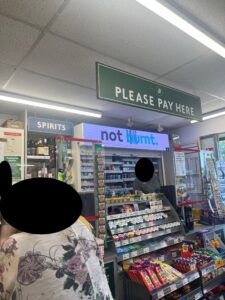
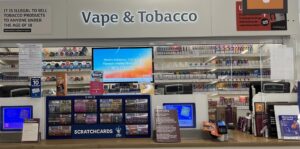
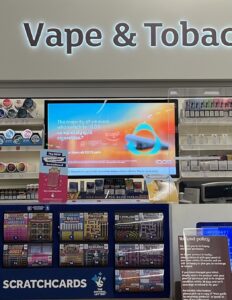
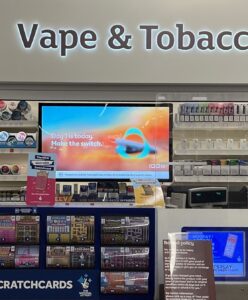
Not only did the ads go against the spirit of the 2002 legislation, but they also appeared to suggest that IQOS is a safer product with its ‘Heated Not Burnt’ message (Figures 1-6). The actions of Philip Morris go directly against the UK Government’s express wishes. The Minister for Health wrote to Philip Morris International in June 2018 asking the company to desist marketing IQOS, stating that it did not share the industry position that TAPA 2002 does not cover IQOS. “It is our opinion that HEETs [the tobacco sticks that are used in the IQOS device] are a tobacco product, and therefore that advertisements promoting HEETs and the IQOS device constitute prohibited tobacco advertisements for the purposes of TAPA.” (Figure 7) In June 2025, the government requested that both Morrisons and Sainsburys supermarkets stop “advertising and promoting” HTPs. Philip Morris International has responded saying that it does not agree that marketing IQOS breaks any rules.
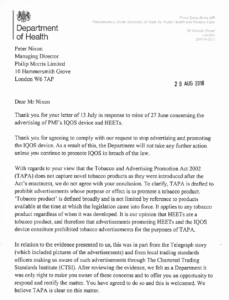
The Tobacco and Vapes Bill will put an end to this marketing of HTPs as they are explicitly included in the definition of a tobacco product.
Adaptation of disposable vapes to rechargeable against the spirit of the law
Also at POS in May 2025 were prominent adverts for rechargable vapes, letting consumers know that their favourite disposable products would now be available in a ‘rechargeable’ format. For example, British American Tobacco’s subsidiary Nicoventures and its vape product Vuse.
The disposable Vuse pen has been replaced by the Vuse Reload pen which requires disposable pods after 1000 puffs (Figures 8-9). When looking at the Vuse pods on the Vuse website, recycling information is not apparent. Whilst a rechargable device is arguably better than a disposable one, disposable pods once again feel like they are against the spirit of the law which aims to reduce youth appeal and put a stop to the enormous environmental toll of these products. Furthermore, reusable vapes are being sold at nearly the same price as their disposable predecessors, offering little incentive for customers to use them as intended. As a result, many continue treating them as disposable products.
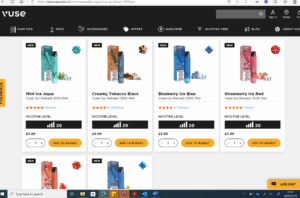
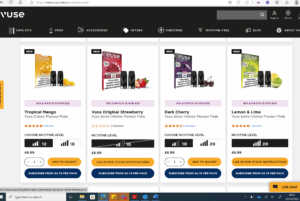
It’s the same old story—novel products, same tactics. The tobacco industry continues to exploit loopholes to minimise the impact of the law on customers and promote its products. Policymakers must recognize these familiar strategies and act decisively, banning point-of-sale advertising without delay and should consider fines for tobacco companies who have explicitly marketed tobacco products against UK law. Meaningful penalties for unlawful promotion are critical steps to prevent history from repeating itself.
Karen Evans-Reeves is the former News Editor for Tobacco Control and an Honorary Research Fellow with the Tobacco Control Research Group at the University of Bath, UK.